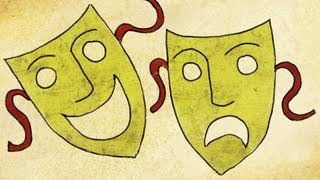(单词翻译:单击)
In the 11th and 12th centuries, most English commoners were illiterate.
在公元十一和十二世纪,大多数的英国平民都是文盲。
Since they had no way to learn the Bible, the clergy came up with an inventive solution:
由于他们无法阅读、了解圣经,神职人员们便想出了一个创造性的解决方案:
they'd create plays out of certain Bible stories so even people who couldn't read could learn them.
他们把一些圣经故事写成剧本,让文盲也能学习圣经。
These were called mystery plays because they revealed the mystery of God's word.
这些戏剧被称为神秘剧,因为它们揭示了神的话语的奥秘。
At about the same time, the clergy also developed plays about the saints of the church, called miracle plays.
大约在同一时期,神职人员也发展出一套有关教会圣徒的剧作,它们被称为圣迹剧。
In the beginning, the clergy members acted out Bible stories on the steps outside the cathedral.
刚开始的时候,神职人员在大教堂的台阶上表演圣经故事。
The audience reacted so well that soon they needed to move out to the street around the town square.
由于观众的热烈回响,很快地,他们必须搬到市镇广场附近的大街上演出。
By building moving carts to put on each play and by lining up one after the other,
通过搭建移动推车来上演每一幕,并且把车按顺序连起来,
they could put on cycles of stories, which would take the viewer from Genesis to Revelation.
他们可以连续演出一系列的故事,观众得以从创世记一路观赏到启示录。
These movable carts, called pageants, looked like huge boxes on wheels. Each was two stories tall.
这些称为露天剧的移动推车,看上去就好像有轮子的巨箱。每辆车都有两层楼高。
The bottom story was curtained off and was used for costumes, props, and dressing.
底层被遮蔽起来,用于服装、道具和梳妆。
The top platform was the stage for the performance.
顶部平台用来演出。
Spectators assembled in various corners of the town,
观众聚集在市镇的不同角落,
and the pageant would move around in the cycle until the villagers had seen the entire series.
露天剧便在镇上移动,循环演出,直到村民们看完整个系列为止。
Soon, the plays required more actors than the clergy could supply.
很快地,这些戏剧必须招募更多演员,比神职人员还要多的演员。
So, by the 13th century, different guilds were asked to be responsible for acting out different parts of the cycle.
所以到了十三世纪时,不同的行会便被要求负责这些循环故事中不同部分的演出。
The assignments were meant to reflect the guilds' professions.
而这些演出得要反映行会的专业。
For example, the carpenter's guild might put on the story of Noah's Ark, and the baker's guild might put on The Last Supper.
比如说,木匠行会可能得呈现《诺亚方舟》的故事,面包师傅的行会可能要演出《最后的晚餐》。
Can you imagine what might happen to the story if the butcher's guild put on The Crucifixion of Christ?
你能想象如果屠夫行会演出《耶稣受难记》,他们会怎样表现耶稣钉十字架的故事吗?
Yes, without the clergy, the plays soon started changing from their true Bible stories.
是的,少了神职人员的参与,这些剧目便很快地脱离原本的圣经故事。

By the end of the 14th century, a new form of drama, called the morality play, had evolved.
到了十四世纪,便发展出一种新形式的、被称为道德剧的戏剧型态。
Faith, truth, charity, and good deeds all became characters on the stage.
信仰,真理,慈善,好人好事,全变成了舞台上的角色。
And, at the same time, the opposite virtues of falsehood, covetousness, worldly flesh, and the devil became the antagonists.
同时,道德的对立面,虚假,贪婪,世俗肉体和魔鬼,皆成了反派。
The morality plays were allegorical stories in which these characters battled for the control of the soul.
道德剧是一种寓言故事,这些角色们为了争取灵魂的控制权而大动干戈。
Audiences loved the immoral characters, and spectators were encouraged to interact with the actors.
观众们不但喜欢不道德的角色,还可以热情地与演员进行互动。
Throwing rotten food and even getting into scuffles with other spectators became very common.
投掷腐烂的食物或观众相互群殴的场面变得相当常见。
The character of the devil often would roam through the crowds
魔鬼的角色往往漫游于人群之中,
and pull unsuspecting watchers into a hell that was depicted as a dragon's mouth.
将毫无戒心的观众拖到画作为龙口的地狱之中。
The virtuous Biblical stories had morphed into crude and sometimes comic stories.
有道德的圣经故事,转变为了野蛮的、时而滑稽的故事。
The clergy intended to teach against immorality.
神职人员原本打算以此教育人民对抗邪恶。
How ironic, then, that the morality plays actually encouraged vices as more popular than virtues.
讽刺的是,道德剧催化了恶行,令其比美德更受欢迎。
By the mid-15th century, the church started to outlaw these performances.
到了十五世纪中期,教会开始禁止这类表演。
Town charters required that any theater must be built outside the city wall.
市镇的宪章规定,任何剧院都必须建立在城墙外头。
One of the first theaters was built like a larger version of a pageant,
其中一个剧院被打造得像个大版本的露天剧,
with tiers of gallery seating encircling a grassy area in front of the stage. Sound familiar?
剧场还有一排排楼座,包围舞台前的草地。听来很熟悉吧?
A young William Shakespeare developed his craft here at the theater that was eventually renamed The Globe.
年轻的威廉·莎士比亚就在这剧院里创作他的剧作,它最终更名为环球剧场。
The medieval morality play had led to Renaissance playwrights who were inspired by the inner struggles and the conscience of man.
中世纪的道德剧成就了文艺复兴时期的剧作家,他们从内心的挣扎以及人类的良知中获得了启发。
And that, in essence, is how drama emerged as a literary art form.
这就是作为一种文学艺术形式的戏剧如何出现的。


